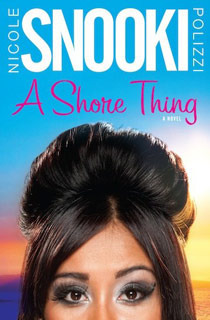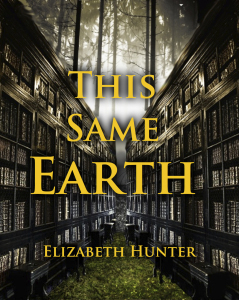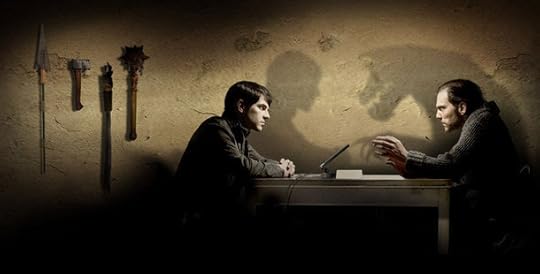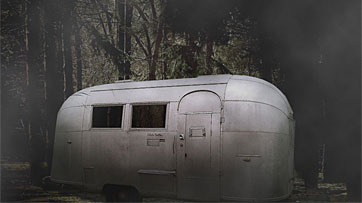Elizabeth Hunter's Blog, page 46
November 7, 2011
November Promotion: Read a Book. Make a Difference.
As many of you who have been reading my fiction for a while know, family is really important to me. And if there is a common theme that runs through my work, it is this: Family is what you make it. Family comes in many forms. Some of us have been blessed with amazing biological families (I count myself among them) and some of us have created our own families around us built from relatives, friends, and others who have come into our lives and touched us profoundly.
So I'm sure it will come as no surprise to most of you that the cause of adoption, particularly from the US foster care system, is something that I'm passionate about. According to AdoptUSKids.org, there are currently 115,000 children eligible and waiting in the United States foster care system to be adopted. Most of these children aren't babies, but I believe that every single one of them deserves a permanent and loving family.
November is National Adoption Month. Last year, 4500 children finalized adoptions on November 19th, National Adoption Day, and even though I'm a very little fish in a very big pond, I'd like to do my part to help. For this reason, I'm pledging to donate 100% of the November proceeds for my first book, A Hidden Fire, to the Dave Thomas Foundation for Adoption. Now, I don't have a bestseller, but I have been able to recoup most of my costs putting out the book from my October sales; so I'm almost in the black, and I have you readers to thank for it. I'd like to spend this month promoting the book and this fantastic organization and cause.
I'm just starting out, but every little bit helps. And while I want my book to find new readers, I really hate promotion. But I can feel good about promoting this. Some people give away free books or host contests to create word of mouth about their fiction, and all that is great, but I'm hoping that I can get the word out about my book and raise some awareness and money for a really excellent charitable organization that supports a cause that I'm passionate about.
I want to give credit to YA author Patricia Carrigan for tweeting the link to RABMAD (Read A Book. Make A Difference.) the other day, which inspired me to think about what cause I could use my (very small, but growing) platform to support. I'm so excited about this project and I'm excited about the Dave Thomas Foundation for Adoption. I'll be doing a post later in the week highlighting more information about this amazing organization and what it has done to promote adoption from the foster care system.
Also, if you have a story about how adoption (any kind!) has impacted your life or family in a positive way, email me! I'd love to hear from you. I'm opening my blog this month to guest posts from readers and writers about how adoption changes lives. Hopefully, we can do our part to make this holiday season a joyful one for more adoptive families.
Thanks for reading and for your support,
Elizabeth








November calls for a promotion I can get behind.
 As many of you who have been reading my fiction for a while know, family is really important to me. And if there is a common theme that runs through my work, it is this: Family is what you make it. Family comes in many forms. Some of us have been blessed with amazing biological families (I count myself among them) and some of us have created our own families around us built from relatives, friends, and others who have come into our lives and touched us profoundly.
As many of you who have been reading my fiction for a while know, family is really important to me. And if there is a common theme that runs through my work, it is this: Family is what you make it. Family comes in many forms. Some of us have been blessed with amazing biological families (I count myself among them) and some of us have created our own families around us built from relatives, friends, and others who have come into our lives and touched us profoundly.
So I'm sure it will come as no surprise to most of you that the cause of adoption, particularly from the US foster care system, is something that I'm passionate about. According to AdoptUSKids.org, there are currently 115,000 children eligible and waiting in the United States foster care system to be adopted. Most of these children aren't babies, but I believe that every single one of them deserves a permanent and loving family.
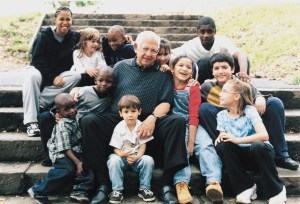 November is National Adoption Month. Last year, 4500 children finalized adoptions on November 19th, National Adoption Day, and even though I'm a very little fish in a very big pond, I'd like to do my part to help. For this reason, I'm pledging to donate 100% of the November proceeds for my first book, A Hidden Fire, to the Dave Thomas Foundation for Adoption. Now, I don't have a bestseller, but I have been able to recoup most of my costs putting out the book from my October sales; so I'm almost in the black, and I have you readers to thank for it. I'd like to spend this month promoting the book and this fantastic organization and cause.
November is National Adoption Month. Last year, 4500 children finalized adoptions on November 19th, National Adoption Day, and even though I'm a very little fish in a very big pond, I'd like to do my part to help. For this reason, I'm pledging to donate 100% of the November proceeds for my first book, A Hidden Fire, to the Dave Thomas Foundation for Adoption. Now, I don't have a bestseller, but I have been able to recoup most of my costs putting out the book from my October sales; so I'm almost in the black, and I have you readers to thank for it. I'd like to spend this month promoting the book and this fantastic organization and cause.
I'm just starting out, but every little bit helps. And while I want my book to find new readers, I really hate promotion. But I can feel good about promoting this. Some people give away free books or host contests to create word of mouth about their fiction, and all that is great, but I'm hoping that I can get the word out about my book and raise some awareness and money for a really excellent charitable organization that supports a cause that I'm passionate about.
I want to give credit to YA author Patricia Carrigan for tweeting the link to RABMAD (Read A Book. Make A Difference.) the other day, which inspired me to think about what cause I could use my (very small, but growing) platform to support. I'm so excited about this project and I'm excited about the Dave Thomas Foundation for Adoption. I'll be doing a post later in the week highlighting more information about this amazing organization and what it has done to promote adoption from the foster care system.
 Also, if you have a story about how adoption (any kind!) has impacted your life or family in a positive way, email me! I'd love to hear from you. I'm opening my blog this month to guest posts from readers and writers about how adoption changes lives. Hopefully, we can do our part to make this holiday season a joyful one for more adoptive families.
Also, if you have a story about how adoption (any kind!) has impacted your life or family in a positive way, email me! I'd love to hear from you. I'm opening my blog this month to guest posts from readers and writers about how adoption changes lives. Hopefully, we can do our part to make this holiday season a joyful one for more adoptive families.
Thanks for reading and for your support,
Elizabeth








November 5, 2011
Real Mystery: The Amber Room
 Often called the Eight Wonder of the World, the Amber Room of Imperial Russia is a true mystery of modern history. Consisting of giant panels of intricately carved and fitted amber mosaics, this stunning gift from Prussian King Freidrich Wilhelm I to Peter the Great was built between 1701 and 1709. On its completion, it covered 55 square meters at the Catherine Palace in St. Petersburg, and contained over six tons of precious carved amber.
Often called the Eight Wonder of the World, the Amber Room of Imperial Russia is a true mystery of modern history. Consisting of giant panels of intricately carved and fitted amber mosaics, this stunning gift from Prussian King Freidrich Wilhelm I to Peter the Great was built between 1701 and 1709. On its completion, it covered 55 square meters at the Catherine Palace in St. Petersburg, and contained over six tons of precious carved amber.
 But the mystery of the Amber Room lies not in its impressive creation, but its enigmatic ends. During World War II, Russian curators attempted to remove the panels to protect them from the Nazis, but the old amber crumbled at their attempts. The room was papered over, hidden under dull wallpaper, and the Russians hoped that it might escape Nazi attention. Sadly, the Amber Room was too famed and valuable a prize to be overlooked. It was disassembled and carefully transported to Konigsberg, Germany, where it disappeared from the historical record.
But the mystery of the Amber Room lies not in its impressive creation, but its enigmatic ends. During World War II, Russian curators attempted to remove the panels to protect them from the Nazis, but the old amber crumbled at their attempts. The room was papered over, hidden under dull wallpaper, and the Russians hoped that it might escape Nazi attention. Sadly, the Amber Room was too famed and valuable a prize to be overlooked. It was disassembled and carefully transported to Konigsberg, Germany, where it disappeared from the historical record.
There are many theories about what could have happened to it. Vague reports and wild speculation placed the panels in hidden mine shafts, buried in basements, stolen by soldiers, or even sunk at the bottom of the Atlantic, destroyed in a German submarine. Was it destroyed in Allied bombing? Stolen by treasure hunters? Reconstructed in some secret compartment that Geraldo will someday unearth? (Okay, that last one probably won't happen.) Experts say that it's entirely possible the amber itself has crumbled into dust, as this fossilized tree resin will deteriorate if not cared for properly. The definitive answer will probably never be known.
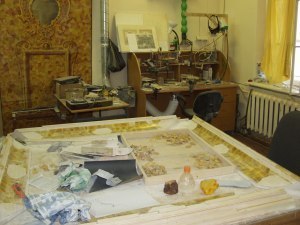 While the original can never be duplicated, a reconstruction of the Amber Room was started in 1979 based on original photographs of the famed chamber. A joint endeavor by Russian artists and German and Russian donations, it was completed in 2003 and dedicated in a joint ceremony by Russian President Vladimir Putin and German Chancellor Gerhard Schröder, a gesture that honored the original Prussian gift and the mutual pride in the project. It now resides again at the Catherine Palace.
While the original can never be duplicated, a reconstruction of the Amber Room was started in 1979 based on original photographs of the famed chamber. A joint endeavor by Russian artists and German and Russian donations, it was completed in 2003 and dedicated in a joint ceremony by Russian President Vladimir Putin and German Chancellor Gerhard Schröder, a gesture that honored the original Prussian gift and the mutual pride in the project. It now resides again at the Catherine Palace.
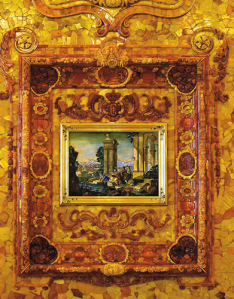 The Amber Room has been featured in works of fiction, non-fiction, and film. If you're looking for a fictional treatment, Steve Berry's first thriller was called The Amber Room and the mystery was central to the plot. For a non-fictional investigation of what might have happened to the room, look up The Amber Room: The Fate of the World's Greatest Lost Treasure by Catherine Scott-Clark and Adrian Levy.
The Amber Room has been featured in works of fiction, non-fiction, and film. If you're looking for a fictional treatment, Steve Berry's first thriller was called The Amber Room and the mystery was central to the plot. For a non-fictional investigation of what might have happened to the room, look up The Amber Room: The Fate of the World's Greatest Lost Treasure by Catherine Scott-Clark and Adrian Levy.








November 4, 2011
"And then what happened?" redux
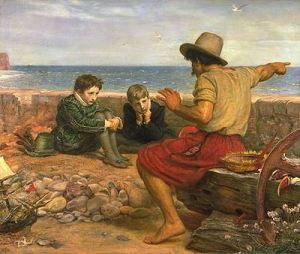 It irks me to see at rant at the top of my page, so I'm reposting something I wrote back in May, edited and expanded a bit. With so many people I know participating in NaNoWriMo, and a lot of new followers since then, I thought I'd repost it because it deals with one of the key components of storytelling and one that, strangely, a lot of writers seem to lose sight of. Plot. Thanks, Claire, for mentioning that this column had helped you! I hope it might help a few others.
It irks me to see at rant at the top of my page, so I'm reposting something I wrote back in May, edited and expanded a bit. With so many people I know participating in NaNoWriMo, and a lot of new followers since then, I thought I'd repost it because it deals with one of the key components of storytelling and one that, strangely, a lot of writers seem to lose sight of. Plot. Thanks, Claire, for mentioning that this column had helped you! I hope it might help a few others.
I will not be participating in NaNo. I wish you all luck, but I just finished the first draft for the third Elementals book, I'm starting on Book Four, and I'm starting promotion for Book Two, which will be out the beginning of December. *phew* Yeah, all that and a giant Hunter family Thanksgiving extravaganza? NaNo ain't gonna happen, folks. But I wish you luck! I'm looking forward to hearing about your progress and reading your pieces when you put them online or (eventually) publish!
So, without further ado, let me ask you a question:
"And then what happened?"
"And then Jack Sparrow killed the sea monster! The one making the bubbles under the water."
"How'd he kill it?"
"With his sword."
"And then?"
"That was all. He sailed away in his boat. He had things to do."
"That's it?"
"Yep."
"Good story."
"Thanks, Mom."
I've recently gotten into the habit of asking my son to tell me a story at bedtime instead of the other way round. I have to say, for someone who's still learning to read, he tells a pretty good tale.
But isn't that the point? People have been telling stories long before we started writing them down. Storytelling is an essential part of the human experience. Books are just one way of telling stories. We tell them through film, photography, music, and so many other mediums.
The point is the story.
"And then what happened?"
It's the universal question with infinite answers. When I was studying linguistics, we studied animal communication of many sorts; but while animals may communicate, only human beings have the capacity for creative language. Whale sounds are beautiful and evocative, but there is no epic whale poetry. Bumblebees can communicate the exact location of a pollen source to their hive, but they can't tell you this funny story about their brother-in-law.
What does this have to do with writing?
Everything.
How much time do you spend on your story? Have you fallen in love with a character or a turn of phrase, but don't really know what to do with either? Do you have an intricately drawn setting, but aren't sure exactly what's going to happen there?
One thing that a lot of writers don't do (but should) is timeline. Just write out a calendar for your story and then think. Is it logical for the characters that met a month ago to already be in love? Maybe it is, within the context of your story. What action is happening to drive the plot forward? Are you dropping early hints about the conflict that keep your tension levels high? If you're not, readers may lose interest.
Do you view your chapters as small stories within themselves? How about individual scenes? Remember, the point is to keep people reading. Every time they get to a stopping point (a scene break, a chapter break) you want them to keep turning that page because they just have to know…
"And then what happened?"
My son asked me this question for years at bedtime, and now I'm the one asking it. I ask him. I ask myself when I sit down to write. I ask my friends when they send me a great story I want to read more of. It's all about the story.
When was the last time you read a beautiful piece of writing, but lost interest when the story wasn't compelling? What will you put up with from a piece of writing if you get hooked on the plot?
Thanks for reading,
Elizabeth
(reposted from a column in May, 2011)








November 3, 2011
Just call me Ranty McRantster for tonight.
I don't allow myself to rant all that much. There are a couple reasons for this. One, I tend to think that listening more than talking is a good rule of thumb in life. Two, the more you rant, the less people listen, and I'd like to be considered someone that people listen to. However, now that I've officially jumped into the self-published author pool, there are a few rants that I need to make to maintain my sanity. Feel free to tune out if you're not interested.
Most criticism in the whole self/indie-published versus trade published debate holds no interest for me. I've chosen for reasons listed here to self-publish and I'm very proud of that. I'm assuming all the risk for (hopefully) future reward and the satisfaction of playing this game by my own rules.
That said…do not #%$^& make assumptions about me, my book, or my writing process because you choose to label me a certain way. You think all self-published writers are crap? You think we're all publishing house rejects? You think we all dash off work and post it on Amazon without giving a crap about quality? $%!#@ you. I don't curse all that much because my grandmother told me it was the sign of a poor vocabulary, and I happen to have a kick-ass one, but seriously, impale yourself upon your own appendage.
You want to know how many times I've been rejected by a "real" publishing house? Zero. Because I have no personal need to be evaluated by the "guardians of our literary heritage" (thanks, Dave) who published this:
in order to know I've written a good book. Don't get me wrong, I face bouts of self-doubt that would make the healthiest ego weep, but I'm old enough, smart enough, and have enough honest people around me to write a book, have that book edited by people I trust, and send it out into the world knowing that I'm not asking people to buy and read "CRAP." Don't make assumptions about me. You'll just make yourself look stupid.
Now, for the indie crowd, it pisses me off when I read people who say that all writers who choose a traditional route are idiots. They're not. They have a different way of looking at this business (and it is a business, people) that you don't share, but don't assume that they're mindless drones who are following along because they're doing the bidding of their overlords in New York. Also, keep in mind that most of the people in the great, evil publishing houses in New York or elsewhere got involved in a very competitive industry because of one main reason: They love books. No one lives the life of a rich celebrity by being successful in publishing. I have friends who work in that draining business, and I know that they work their asses off most of the time. It's not for fame and fortune.
Finally, indie writers, don't rush your book off with poor editing, proofing, plot development, weak characterization, and more and then get on your high horse when you get called "crap." Just don't! Don't make your standard be: "Better than the stuff that (insert publisher here) puts out." Don't! Don't you know, you're going to be held to a high standard by readers and reviewers? They don't care how long you've dreamed about seeing your book in print or in the Kindle store. And most of them probably don't care who publishes it. (Seriously, think of your favorite book. Now, who published it? Don't remember? Neither do most people.) Readers care about getting a good book, so make them glad they spent the money, whether it's $0.99 or $9.99. Doesn't matter. They paid for it and your name is on it. Don't put your name (or your pen name) on crap.
I'm sure I could go on, but I won't. Why? Because rants are annoying (especially my own), and I'm almost out of coffee. Plus, my son's judo class is almost finished and frankly, I've got way more important things to do.
If you're still reading, thanks.
E








November 2, 2011
New playlist: This Same Earth
[image error]
Hey folks! Sorry if you got numerous emails from posting. Playlist.com was being kind of wonky on me. Here's the playlist for This Same Earth . It's not loading from the link, unfortunately, but if you hit the "Pop-out player" option, that should take you to the playlist. Enjoy!
http://www.playlistproject.net/mc/mp3player_new.swf











November 1, 2011
Teaser Tuesday: This Same Earth Cover Reveal
Ta-da! It's Teaser Tuesday, which means that, not only do you get another entry into Beatrice's journal, but you get the cover for This Same Earth!
I'm pretty fond of it. Let me know what you think:
I haven't set a firm release date for Book Two, but I'm pretty sure it will be the first week of December, just one month away! Until then…
From the journal of Beatrice De Novo…
Thanks for reading,
E








October 31, 2011
Halloween and a taste of "Grimm"
When I first saw the previews for the two shows I was most interested in this fall, Once Upon a Time and Grimm, I thought something along the lines of, "Oh, typical. Two networks, two different takes on the same theme. Instant competition, instant press. Yeah, that's kind of irritating, get an original idea." BUT, after having watched the pilots for both series, I can tell you that the argument is pretty much invalid because the series are two completely different animals. While Once Upon a Time has a whimsical and otherworldly feel, Grimm is much darker fantasy, very grounded in the real world, and more of a police procedural with a twist.
[image error]The premise of Grimm is that, far from a fairy tale world, the original Grimm's Fairy Tales were not just stories but, as one character cleverly puts it, "profiling." The descendants of the Grimm family have the ability to see the otherworldly creatures around them when the creatures lose control and cannot maintain their human disguises. What do you know? Our hero, Nick Burkhardt, is one such Grimm that is only now discovering his powers. The show draws from the old German mythology, including "blutbaden" the original Big Bad Wolves, or wolfmen, and some strange creatures that are beautiful women until their faces seem to rot away. The pilot didn't delve into the greater world too much, which was a wise choice as it leaves a lot of mystery to explore and avoids the dreaded "info-dump" that bogs down what should be a fast-paced show. Also, point of interest, I will never wear a red hoodie sweatshirt again. Watch the pilot to find out why.
 The show is filmed in Portland. Why is this significant? Well, the deep, dark forests of the Pacific Northwest not only create some great reasons not to go into the woods, but also put me in mind of one of my favorite shows of all time, The X-Files. Is this intentional? Probably. The co-creator of the show has a pretty awesome supernatural television pedigree that starts with The X-Files and includes Buffy. This show seems to be following a similar format to The X-Files. It is primarily a police procedural with hints of an overarching mythology, which means that it's not the end of the world if you miss an episode here or there, though you may find you don't want to.
The show is filmed in Portland. Why is this significant? Well, the deep, dark forests of the Pacific Northwest not only create some great reasons not to go into the woods, but also put me in mind of one of my favorite shows of all time, The X-Files. Is this intentional? Probably. The co-creator of the show has a pretty awesome supernatural television pedigree that starts with The X-Files and includes Buffy. This show seems to be following a similar format to The X-Files. It is primarily a police procedural with hints of an overarching mythology, which means that it's not the end of the world if you miss an episode here or there, though you may find you don't want to.
Now, I'll admit, I went into watching this pilot with higher expectations than I did with Once Upon a Time, so I did find a few things I'd like to see improved on; however, overall, I really liked the show. I think the chemistry between Nick (David Giuntoli) and his partner could use some work. I was getting mixed messages about how long they had been partners, some dialogue hinting that they were still getting to know each other, and some seeming to imply a deeper level of trust. Still, I think the acting was good, and the potential for them to grow is there. Similarly, we didn't see much interaction between Nick and his live-in girlfriend, Juliet, which makes his conflict over how deeply he wants to involve her in his world a bit bland. What should be a really torturous decision for Nick doesn't seem all that bad because we haven't been invested in their relationship. Can this develop? Sure, I'd love to see Juliet become a bigger part of the show.
Two character stand-outs would have to be Eddie (Silas Weir Mitchell), a reformed bludbat, or big bad wolf, and Aunt Marie (Kate Burton) Nick's mysterious aunt who shows up with her old Airstream bearing some bad news and a strange green key. (Also, Aunt Marie is an ass-kicking librarian. Further proof that my attempts to make librarians the next action heroes is working. Go Aunt Marie! Beatrice applauds you! No idea what I'm talking about? Read my book.) I have a sneaking suspicion that Aunt Marie may not last long in the series, so catch her while you can. I'm looking forward to seeing more creatures reveal themselves throughout the series. The source material is dark and rich, so I'm curious to see what the writers do with it.
In summary, don't feel like you're getting more of the same if you're a fan of Once Upon a Time. Likewise, if Once Upon a Time is not your cup of tea, you might give Grimm a look. The series are very different in subject, style, and atmosphere. I found both to be really enjoyable in completely different ways and I'm looking forward to seeing where both go this season. Grimm is on NBC on Friday night at 9/8C, later than Once Upon a Time and appropriate for the darker tone of the series.
Happy Halloween!
Elizabeth
P.S. NBC has put together a very cool little interactive easter egg where you can snoop through Aunt Marie's trailer. If you're into the show, check it out! It's very cool.


 [image error]
[image error]




October 28, 2011
Friday Publishing Links
 The past couple weeks have been very busy in my world, and the world of independent publishing as a whole. While I had my own launch last week and got the manuscript for Book Two off the editor this week, my friend and fellow writer Nichole Chase has had some new and interesting experiences, I read about an exciting funding idea from David Gaughran, and the Kobo store had some very interesting news for indie authors.
The past couple weeks have been very busy in my world, and the world of independent publishing as a whole. While I had my own launch last week and got the manuscript for Book Two off the editor this week, my friend and fellow writer Nichole Chase has had some new and interesting experiences, I read about an exciting funding idea from David Gaughran, and the Kobo store had some very interesting news for indie authors.
Nichole's first book, Mortal Obligation, has been doing incredibly well on the YA lists at the Kindle store (with good reason, it's a great book) and she's been garnering some really fantastic attention in her native Savannah, Georgia for her involvement in the Paranormal Plumes Society (great name, no?). The Paranormal Plumes are a group of independent authors who have grouped together to participate in a book tour in Savannah this weekend. They're doing a signing, a dinner, and a haunted Savannah tour. I really wish I could go! It's a fantastic promotional idea, and it's garnered some great publicity for them. Nichole and one of the other writers even had a television interview about the tour this past week. Congratulations, ladies! The attention is well deserved.
David Gaughran, the blog author of Let's Get Digital and a regular contributor over at IndieReader.com, posted some really interesting news this morning. Probably lots of you have heard of Kickstarter, the big crowdfunding site. Well, David is using a similar site (one available for non-US projects, get on that, Kickstarter) to explore funding for his novel, A Storm Hits Valparaiso. It's a fascinating idea, and one that could have great funding possibilities for indie writers, particularly once they have established a good fan-base. The post and the comments thread are definitely worth a read.
News from Kobo, the third largest e-bookstore (and one more widely available for many international readers) is that they will be launching their own publishing platform some time next year. Currently, writers have to be accepted into Smashwords Premium Catalogue (which just happened with A Hidden Fire, yay!) to be distributed to Kobo. This sounds like promising news for indie writers, as we'll be able to directly publish to the Kobo store in the near future. Let's see if Apple gets a clue and uses something similar to invigorate their iBooks store.
In my personal publishing world, I've been incredibly gratified to recieve such great feedback from reviewers and readers about A Hidden Fire. The book currently has a 4.83 rating over at Goodreads, and eleven five star reviews over at Amazon! If some of you took the time to read and review the book, thank you so much. That's amazing. I'll have the cover reveal next week for This Same Earth over at the Elemental Mysteries site, so make sure you check that out if you're interested. It will be out in the beginning of December.
I hope you are planning something fun this Halloween weekend! My house will be overrun with ninjas to the best of my knowledge.
Happy Halloween!
Elizabeth








October 27, 2011
Real Life Mystery: The House of Wisdom
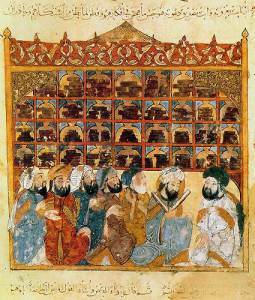 While the mystery surrounding a lost library in A Hidden Fire is entirely fictional, there have been numerous libraries in history which have been lost, destroyed, or stolen. Perhaps the most famous for Western readers is the Royal Library of Alexandria, which contained vast quantities of knowledge from the ancient world. Not as commonly known is the House of Wisdom, what could be considered the "special collections" of the great libraries of medieval Baghdad.
While the mystery surrounding a lost library in A Hidden Fire is entirely fictional, there have been numerous libraries in history which have been lost, destroyed, or stolen. Perhaps the most famous for Western readers is the Royal Library of Alexandria, which contained vast quantities of knowledge from the ancient world. Not as commonly known is the House of Wisdom, what could be considered the "special collections" of the great libraries of medieval Baghdad.
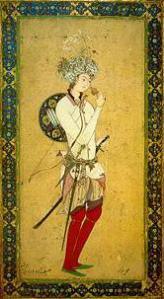 Founded by Caliph Harun al-Rashid in the 9th century, the House of Wisdom was more than we think of a library today. It flourished as a center of learning and translation from the ninth to the thirteenth century, before the advent of the modern university. Scribes and scholars of many nationalities and faiths congregated there to discuss the humanities and translate texts from Persian, Greek, Sanskrit, and other ancient languages.
Founded by Caliph Harun al-Rashid in the 9th century, the House of Wisdom was more than we think of a library today. It flourished as a center of learning and translation from the ninth to the thirteenth century, before the advent of the modern university. Scribes and scholars of many nationalities and faiths congregated there to discuss the humanities and translate texts from Persian, Greek, Sanskrit, and other ancient languages.
The caliphs who expanded the libraries of Baghdad sent for books from as far as Sicily to incorporate into the House of Wisdom. Legends even say that vast caravans traversed the desert carrying nothing but scrolls destined for its scribes. In addition to the humanities, it became a center of learning for disparate and numerous subjects such as mathematics, alchemy, zoology, and even cartography. It revived and preserved much of the history of the Persian Empire, which ruled the ancient world for centuries.
 The House of Wisdom also contributed directly to libraries today. While the knowledge of paper-making had been known for some time from Chinese prisoners, the library helped to expand its use, making paper the common material for scrolls instead of the more costly and harder to produce papyrus. The ease of paper production caused far greater numbers of books to be preserved and distributed. The House also introduced the concept of a card catalogue for the library, grouping works by genre and author instead of other organizational methods.
The House of Wisdom also contributed directly to libraries today. While the knowledge of paper-making had been known for some time from Chinese prisoners, the library helped to expand its use, making paper the common material for scrolls instead of the more costly and harder to produce papyrus. The ease of paper production caused far greater numbers of books to be preserved and distributed. The House also introduced the concept of a card catalogue for the library, grouping works by genre and author instead of other organizational methods.
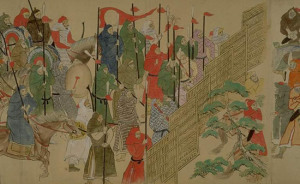 Tragically, the House of Wisdom was destroyed in 1258 during the great Mongol invasion of Baghdad. The libraries of the city were destroyed and countless ancient manuscripts were thrown into the Tigris River. Reports at the time say that the river ran black for days as the ink from this vast collection of knowledge washed downriver and out of history. There is no way of knowing all that was lost, but the ancient and modern world are poorer because of it.
Tragically, the House of Wisdom was destroyed in 1258 during the great Mongol invasion of Baghdad. The libraries of the city were destroyed and countless ancient manuscripts were thrown into the Tigris River. Reports at the time say that the river ran black for days as the ink from this vast collection of knowledge washed downriver and out of history. There is no way of knowing all that was lost, but the ancient and modern world are poorer because of it.
For two different takes on the subject, check out The House of Wisdom by Jim al-Khalili or The House of Wisdom by Jonathan Lyons, both available at Amazon.
Thanks for reading,
Elizabeth










